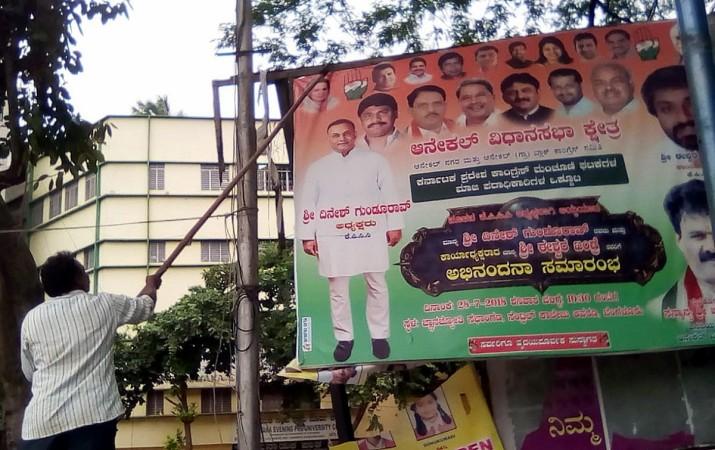
The city civic authority, Bruhat Bengaluru Mahanagara Palike (BBMP) in Bengaluru was slapped with a deadline to rid the city of illegal flexes and hoardings by the Karnataka High Court. The seven-day deadline has come to an end but illegal posters, banners and flexes dot the city despite BBMP's best efforts.
The High Court has rapped the city civic agency over its failure to completely rid the city of the eyesore. The BBMP had reportedly taken down over 21,000 illegal flexes since August 1 following an HC order to have them removed, The Times of India reports. Many hoardings which were erected for party campaigns and ahead of the elections were not removed after.
The problem of illegal flexes is nothing new to Bengaluru. Massive hoardings of advertisements and party campaigns cropping up in various parts of the city, especially at inconvenient locations, had attracted severe flak from the citizens. However, it has not prompted any visible action from the concerned officials, until recently.
According to a Times of India report, all advertising hoardings in the state capital are deemed illegal since the licenses have not been renewed since 2016, BBMP commissioner N Manjunatha noted. He added:
The last time we received revenue for these advertisements was for 2016. Following GST rollout we were no longer permitted to collect advertisement revenue. Due to this, we have to amend our advertisement policy bylaws which we'll do in the coming months. During this one year period, the city can remain clean and we can deliberate on the bylaws. After this, the council can take a decision on whether it wants to continue with the ban.
Advertising hoardings banned in public
Earlier this week on Monday, August 6, the civic agency passed a resolution banning illegal hoardings of advertisements, banners, flexes and buntings for a year. The rule will be enforced in all 198 wards of Bengaluru.
The ban was approved after noticing an increased number of accidents were caused by the diverted attention of riders and drivers due to the massive advertising hoardings, ToI reported. According to Manjunath, those who fail to comply will be slapped with a fine of Rs 1 lakh or could land in prison for up to 6 months, or both.
A rampant mafia?
While it might be more of an inconvenience to the common man, the issue of illegal hoardings, flexes and banners is more of a mafia than a mere inconvenience.
Advertising through flexes and hoardings does not come cheap. The cost of a single hoarding, depending on the location and duration of time often easily amounts to lakhs of rupees. The advertising agencies, in turn, are required to pay tax to the BBMP to allow the hoardings. Based on a report by Economic Times, the BBMP expected a revenue of Rs 334 crore in the form of tax interest and penalty.
There have been multiple reports in the past alleging officials in the civic agency accepting a lump sum for allowing advertising agencies to illegally erect hoardings and flexes across the city. Moreover, it is a known fact that hundreds of trees in the Garden City are chopped to make way for the massive hoardings.
If the illegality of the issue was not a concern already, what makes it more disturbing is that the BBMP's proposal seeking an amendment in the KMC (Karnataka Municipal Corporation) Act to regularise illegal hoardings was kept under wraps for over a year. This was highlighted during a hearing at the High Court last week, according to a report in The Hindu.
The issue has been closely monitored by the Karnataka High Court as well as the Lokayukta.









